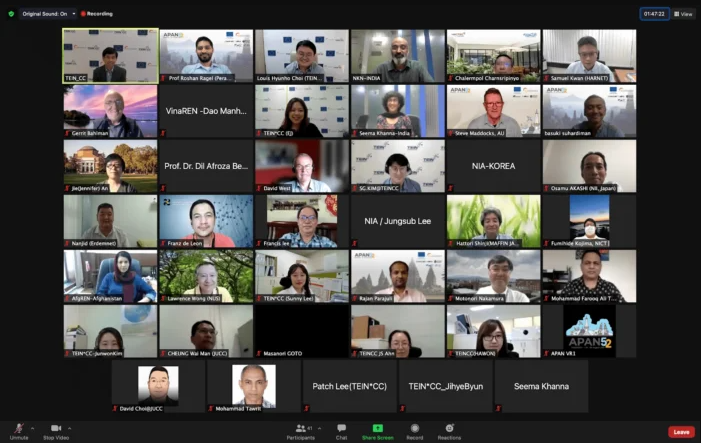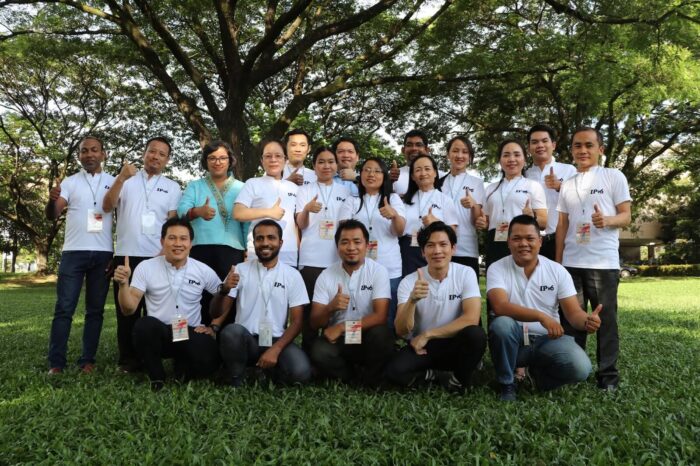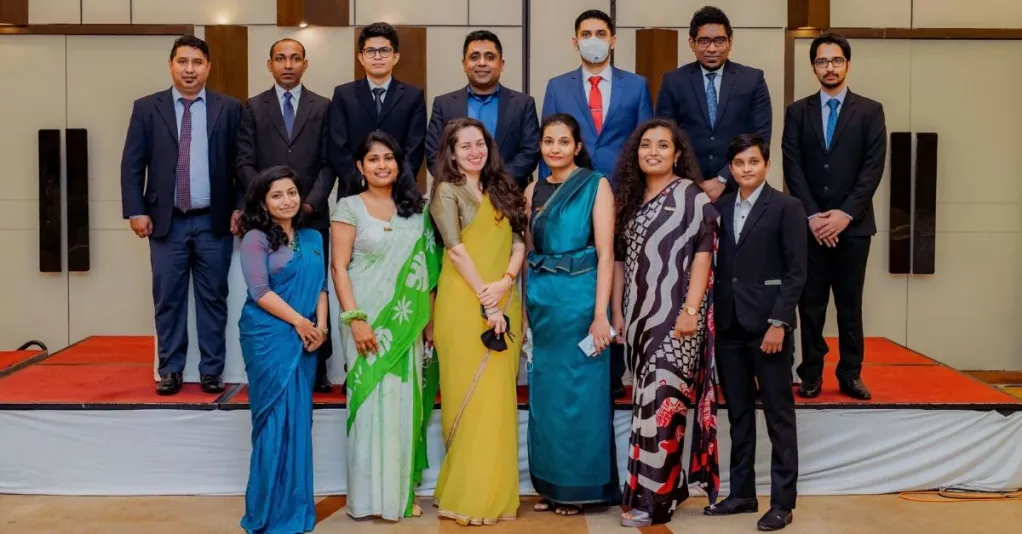Two years in, we’ve witnessed first-hand the disruptive effects of the COVID-19 pandemic on the economy. Several industries ground to a halt almost overnight and struggled to resume operations. One industry that faced such heavy disruptions globally was education. Yet, Sri Lanka was a notable outlier where local higher education quickly shifted online. This continuity was made possible through the efforts of LEARN, Sri Lanka’s National Research and Education Network (NREN), to provide free Zoom accounts, which is a service now commercially worth over $1 million, annually.

Yet, this is only a single example of LEARN’s success in recent times. Over the decades, it has evolved considerably to facilitate global collaborations between local researchers and their international peers. Furthermore, it plays a vital role in the Asian region, supporting NRENs of smaller nations in their development. Describing the importance of an NREN, the Chairman of LEARN, Senior Prof. Chandana P. Udawatte, said, “All around the world, educational institutions have started depending on online learning platforms more for the delivery of uninterrupted educational and research-oriented services.”

At its recently held AGM, the Director representing the University of Colombo at LEARN, Prof. K.P. Hewagamage, echoed the statements by Senior Prof. Udawatte. Going further, he stressed the importance of NRENs having sustainable models to provide their services flexibly to the higher education sector. He pointed out that some may question the value of NRENs and their importance. Nevertheless, as the speakers of the event detailed LEARN’s recent successes and its plans for the future, the value of such a network became apparent to all.
A brief history of LEARN supporting Sri Lankan academia

LEARN has a rich history that predates the existence of the internet in Sri Lanka. Back in April 1989, Sri Lanka embarked on building the island nation’s first Wide Area Network. It was a monumental effort at the time by a group of determined researchers led by Prof. Abhaya Induruwa. The network would become operational in 1995 and soon cover all corners of the country.
Driving this effort was a noble vision to empower Sri Lankan academia. Local researchers could connect, communicate, and collaborate with their global peers by offering high-speed networking infrastructure. In doing so, facilitates international academic collaboration to drive innovation. Today, the NREN is a vital digital backbone connecting universities, research institutions, and the UGC with the world.

Since 2009, LEARN has operated as a limited-guarantee company owned by the UGC and state universities. The organisation has since tirelessly worked to enhance the network’s offerings to empower local researchers better. Beyond affordable high-speed internet access, the organisation also offers several more services. These include email, technical assistance, hosting virtual machines for learning management systems and organising workshops, to name a few.
Furthermore, with its international partnerships, the organisation has offered even more services to empower local academia. At the 12th AGM, the CEO of LEARN, Prof. Roshan Ragel, shed light on the benefits of these partnerships. For example, Sri Lankan researchers can now access the global Eduroam Wi-Fi roaming network and several services offered by global NRENs through the eduGAIN facility. Prof. Ragel also highlighted the leading role the NREN plays in the region. It is among the sixteen primary voting members of APAN (Asia Pacific Advanced Networks) and the Board of Governors of the Asi@Connect Project.
LEARN $1 million success story in keeping higher education alive

LEARN’s most recent success story is how it kept Sri Lankan higher education alive during the pandemic. In 2019, through an international collaboration between LEARN, BdREN, and NORDUnet, the organisation obtained 1000 premium Zoom accounts. A year later, when the pandemic struck and lockdowns forced universities to close their doors, these Zoom accounts proved to be a vital investment.
The organisation quickly obtained an additional 5000 accounts and invested an additional LKR 25 million towards building local on-premise Zoom infrastructure. Finally, discussions between LEARN, the UGC, and local internet providers allowed faculty and students to freely access learning management systems and utilise these Zoom accounts to attend lectures. Prof. Ragel shared that at the height of the fourth wave, LEARN hosted around 150 thousand Zoom sessions in a month, which served almost 7.5 million students and faculty. Since March 2020, it has hosted a total of more than 1.5 million meetings and served a total of almost 80 million participants.
With 12,000 premium Zoom accounts available for local academia, the service is worth nearly $1 million today. While acknowledging it was roughly half of the organisation’s annual revenue, Prof. Ragel stated that the organisation remains committed to offering it as a free service for the betterment of all. “The COVID-19 pandemic has triggered new ways of teaching and learning for all of us. Even though this experience was quite new to both teachers and students, we were able to continue our academic activities without any noticeable shortcomings,” added Senior Prof. Udawatte.
Lessons from supporting regional NRENs

The NREN has also launched several initiatives to support regional researchers along with its admirable efforts locally. For example, it recently facilitated a series of workshops under the UPROUSEwithLEARN initiative for the upskilling of regional NREN staff. It began by upskilling the NREN engineers of Bhutan and Laos. Following the pandemic, these workshops shifted online and saw participants from several Asian nations.
Another major initiative supported by LEARN was the NREN Needs Assessment (NNA) Survey. This initiative was a study commissioned by the Trans-Eurasian Information Network (TIEN*CC) and carried out by the organisation alongside BdREN from Bangladesh. Its purpose was to develop a rigorous model that would aid the evaluation to effectively disburse funds to drive the synergistic growth of NRENs across Asia. Following months of research, LEARN and BdREN created this model. Their research also offered several recommendations to help regional NRENs grow.

Speaking at the AGM, the CTO of LEARN, Dr. Asitha Bandaranayake, shared the results of this research. Across the region, a high-priority need amongst all NRENs was the need for strong regulatory and policy support. The study also looked at the maturity of these networks. It found that the most mature networks, save for BdREN and DrukREN from Bhutan, were from countries with strong economies. Further, even those with high ratings such as LEARN had great potential for improvement.
Going further into the research, Dr. Bandaranayake shared a detailed summary of the regional NRENs involved in the study. LEARN scored highly on the maturity score, indicating its strengths. The pandemic, in particular, highlighted the importance of an NREN to Sri Lankan policymakers. The NNA report committee noted, “Being one of the oldest NRENs in the region, LEARN is well established with complete self-sufficiency and long-term sustainability in their OPEX.”
Sustained growth for the benefit of academia
LEARN has come a long way from its origins 33 years ago. Acting as the digital backbone of Sri Lankan academia, it offers high-speech connectivity and valuable services. Moreover, having graduated from the island nation’s humble shores, it now facilitates collaborative efforts between local and international researchers. Through these collaborative efforts, paired with its dedicated staff, the NREN ensured the continuity of Sri Lankan higher education during the pandemic.
These achievements have shone a light on the vital importance of a national NREN. Looking towards the future, the organisation identifies essential services for its stakeholders and expands its capabilities. “We have recognised the importance of strengthening LEARN by providing necessary resources, including human resources. There is an urgent need to revisit SORs of existing carder positions to obtain necessary approval from the DMS as soon as possible,” said Senior Prof. Udawatte.
With support from policymakers and regional counterparts such as the Asi@Connect project, LEARN aims to create a long-term roadmap for its sustained growth. Chief among these ambitions is establishing its own digital backbone, which is a massive undertaking. Nevertheless, LEARN has shown how investing in academic infrastructure offers invaluable returns to society.
